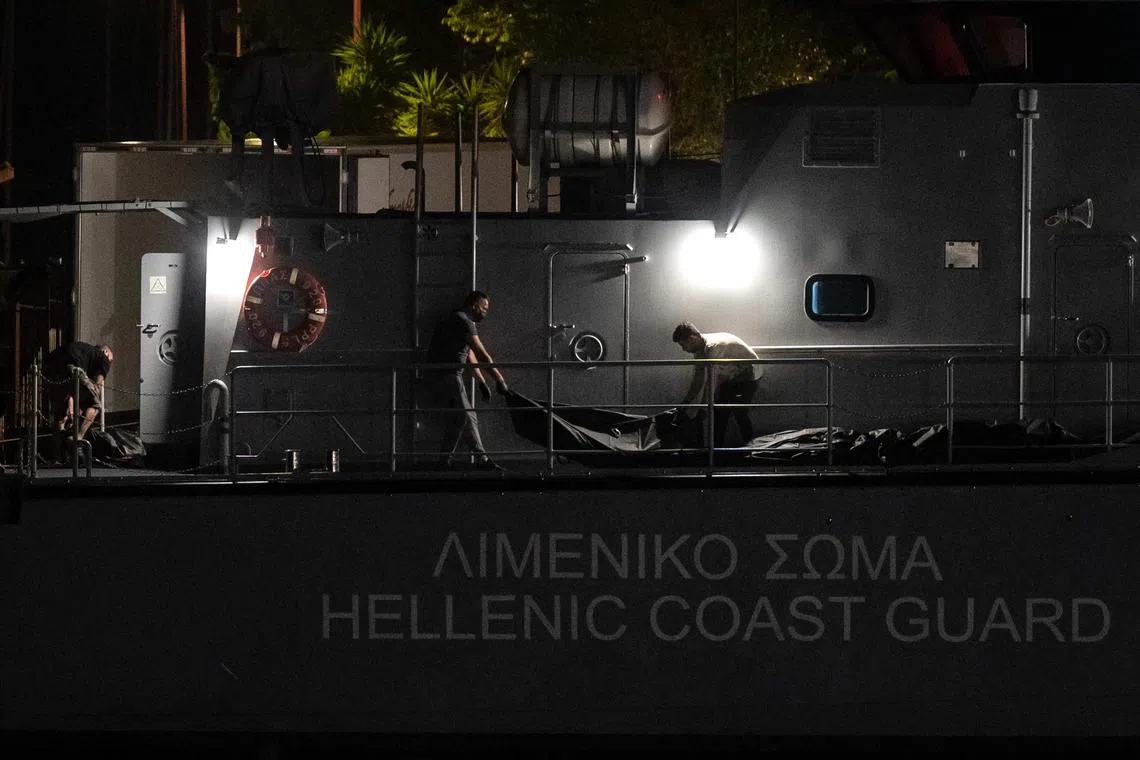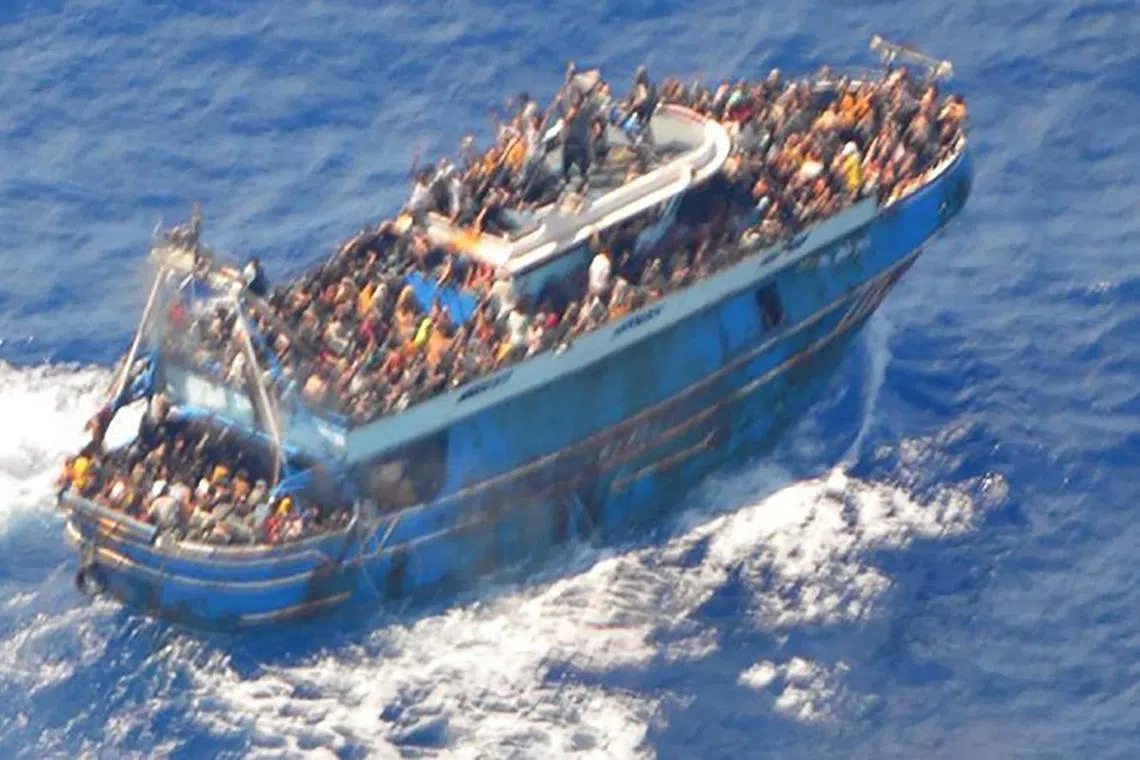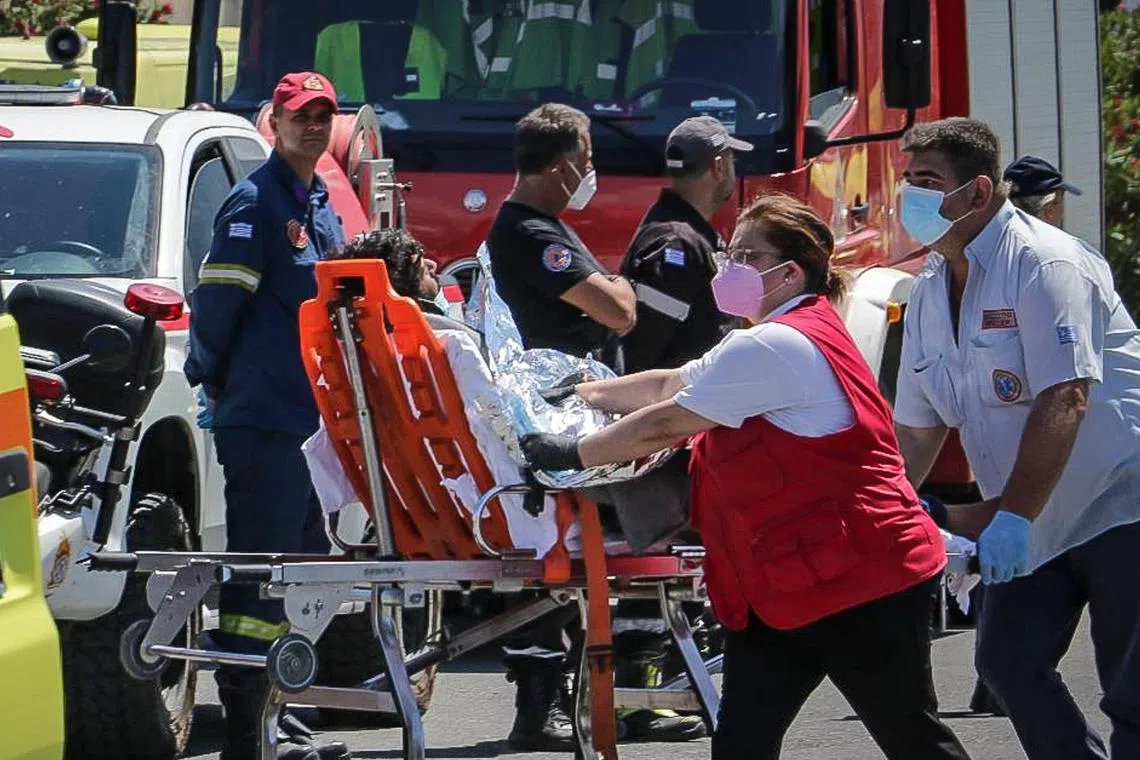Greece scours shipwreck site; hundreds feared drowned in boat’s hold
Sign up now: Get ST's newsletters delivered to your inbox

Bodies of migrants being carried off a Greek coast guard vessel at Kalamata port on June 15. Hundreds of migrants are feared to have died when a crowded fishing boat capsized off the Greek coast on June 14.
PHOTO: EPA-EFE
KALAMATA, Greece – Rescuers scoured the seas off Greece on Thursday following a shipwreck that killed at least 78 migrants,
Reports suggested that between 400 and 750 people had packed the fishing boat that capsized and sank early on Wednesday morning in deep waters about 80km from the southern coastal town of Pylos. The Greek authorities said 104 survivors had been brought ashore.
Outside the office of the coast guard in the port city of Kalamata, where survivors were transferred, a Syrian man whose wife was missing sought answers.
Mr Kassam Abozeed, who lives in Germany, said he last heard from his wife Israa eight days ago. She had paid US$4,500 (S$6,000) to travel on the boat, the 34-year-old said, showing a photograph of her on his phone.
The search operation had not recovered any bodies in more than 24 hours, and victims’ bodies were transferred to a cemetery near Athens for DNA tests. Government sources said the chances of retrieving the sunken vessel were remote because of the depth of the water.
An official from the Greek Shipping Ministry said nine Egyptians were arrested over the shipwreck. Greece’s Skai TV reported that, according to witnesses, the vessel departed from Egypt and stopped at the Libyan port of Tobruk before setting sail for Italy.
A European rescue-support charity said there could have been 750 people on the 20m- to 30m-long boat.
The United Nations’ International Organisation for Migration said initial reports suggested up to 400 people were aboard. Its refugee agency, the UNHCR, said hundreds were feared missing.
“The shipwreck off Pylos marks one of the largest sea tragedies in the Mediterranean in recent memory,” Ms Maria Clara, the UNHCR representative in Greece, told Reuters.
Pope Francis, who visited Greece two years ago to draw attention to the plight of refugees, was “deeply dismayed to learn of the shipwreck... with its devastating loss of life”, the Vatican said in a statement.
‘Our last night alive’
Independent refugee activist Nawal Soufi said in a Facebook post that she was in contact with migrants aboard the vessel from the early hours of Tuesday until 11pm.
“The whole time they asked me what they should do and I kept telling them that Greek help would come. In this last call, the man I was talking to expressly told me: ‘I feel that this will be our last night alive’,“ she wrote.

Men moving bags holding bodies from a coast guard vessel to a refrigerated truck at the port in Kalamata, Greece, on June 14, after a boat sank.
PHOTO: AFP
Greece is one of the main routes into the European Union for refugees and migrants from the Middle East, Asia and Africa.
Aerial pictures released by the Greek authorities of the boat hours before it sank showed dozens of people on the boat’s upper and lower decks looking up, some with arms outstretched.
But Greek officials said people on the crowded decks repeatedly turned down attempted assistance from a Greek coast guard boat shadowing it, saying they wanted to reach Italy.
“You cannot carry out a violent diversion on such a vessel with so many people on board... without any sort of cooperation,” coast guard spokesman Nikos Alexiou told state broadcaster ERT.

An aerial shot taken from a rescue helicopter of migrants on board a fishing vessel in the waters off the Peloponnese coast of Greece, on June 13.
PHOTO: AFP
Alarm Phone, which operates a trans-European network supporting rescue operations and received alerts from people on board a ship in distress off Greece late on Tuesday, said the captain fled on a small boat.
Government officials said that before capsizing and sinking at around 2am on Wednesday, the vessel’s engine stopped and it began making side-to-side movements.
‘Watery graves’
On Thursday evening, thousands of leftist protesters rallied in Athens and the northern city of Thessaloniki demanding that European Union migration policies be relaxed. A group of protesters in Athens hurled petrol bombs at police, who responded with tear gas.
In Kalamata, protesters marched outside the migrants’ shelter. “Crocodile tears! No to the EU’s pact on migration”, read one banner.

Medics carrying a survivor on a stretcher in Kalamata port, after a boat carrying dozens of migrants sank in international waters in the Ionian Sea.
PHOTO: AFP
EU migration policy “turns the Mediterranean, our seas, into watery graves”, leftist Greek leader Alexis Tsipras, who was prime minister from 2015 to 2019 at the peak of Europe’s migration crisis, said during a visit to Kalamata on Thursday.
Under a conservative government in power until May, Greece took a harder stance on migration, building walled camps and boosting border controls.
The country is now governed by a caretaker administration pending an election on June 25.
Greek government spokesman Ilias Siakantaris told Reuters that the biggest challenge for EU border states “is forging a comprehensive EU solution on migration and asylum that respects international law and inclusive humanism”.
The UN has registered more than 20,000 deaths and disappearances in the central Mediterranean since 2014, making it the most dangerous migrant crossing in the world. REUTERS


